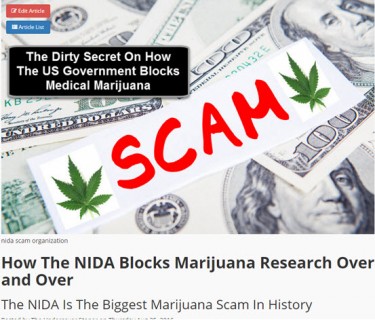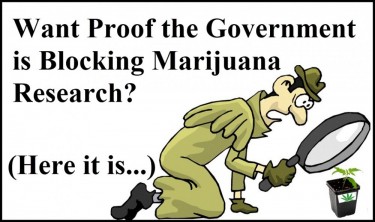
A look into the mind of Nora Volkov, the new head of the National Institute for Drug Abuse
You may not have heard the name Nora Volkow, she is the director of NIDA – the National Institute on Drug Abuse. This is the very agency that funded all of these studies on the dangers of cannabis and other drugs and was used as the arm of the government to justify the ban on cannabis.
I’ve analyzed their studies many times and poked holes in their methods over the years and in my head – Volkow was a mad drug warrior trying to keep the status quo alive.
The problem with this assessment was that it was not based on any fact. I just projected what I thought she was and never took the time to really explore her drug use ideas.
She was recently on the show by the founder of the Drug Policy Alliance, Ethan Nadelmann, where she discussed various different drug policies, including the effects of legalization and youth use.
I have to admit after listening to her I have to say that I was forced to change my view of her. Because of that I saw her in a completely different light.
Here are some of the key points that got me thinking.
No increase in marijuana use among adolescents
Volkow’s first great revelation was her ability to admit when she was wrong. Proponents have said legalizing cannabis won’t increase teenage use, and there is evidence that it might discourage even young people using it.
While there were certain peaks within some population groups, general consumption of youth consumption has remained constant. There is no significant evidence that legalization has any real impact on adolescent consumption – with the exception of “risk perception”.
However, “the expectation that adolescent marijuana use would increase” when states legalized cannabis admitted that “overall, that is not the case.” as reported in Marijuana Moment.
While I’m not a huge fan of NIDA’s views on cannabis in general, it was refreshing to hear the head of the organization admit when the data suggests a different narrative.
Some states have benefited from marijuana legalization
Another refreshing perspective from Volkow was the fact that she could see the benefits in some states after legalization. However, she pointed out that there have been problematic cannabis use in other states, but does not attribute this to the plant, contrary to the guidelines on legalization.
“It is crucial to understand what policy basically protects against negative effects and can actually lead to better results,” said Volkow, who has been in office since 2003. “And we’re funding it.”
I also think it’s important to define “negative impacts” before creating blanket measures that may be difficult to change later. California is currently struggling to keep its cannabis market working and has so far produced far more cannabis than consumers can handle.
This leads to illegal trade outside the state, the closure of old farms, and the burden is placed on the consumer – he is paying excessive fees for his cannabis.
The criminalization of drug use
What surprised me about the interview were her views on the criminalization of drug use. One would think that an agency that has spoken out against drug use in the past would not question current drug control guidelines, but Volkow said it has long been opposed to these ideas.
“Hopefully science will serve to change policy and reduce stigma [around addiction] and basically change the notion of criminalizing people to treat and help people and keep them from relapsing. “
In other words, Volkow believes that drug use and addiction should be a public health issue, not a law enforcement issue. This is what cannabis activists have been saying for years – and there is strong evidence that addressing drug addiction as a public health issue can make a difference.
Admit that NIDA is a political tool
If the head of an agency tells you that his agency was a political tool – you know it’s true. Volkow did not say the word “tool” literally, but indicated it with the following comment.
“Operate (NIDA) in a political context in which punitive prohibition politics, mass arrests” [and] the strongly racial prejudices that go with all of this were omnipresent. “
“From day one I was against criminalizing people because they have substance use disorders. I was very, very vocal. ”“ One of the reasons I took this position was because we can develop science in such a way that politics change. ”
NIDA is ultimately under the authority of the federal government and although the people who work there may have different attitudes towards dealing with drug use and addiction, they are forced to play the political game.
In this case, conduct studies to justify the prohibition of drugs.
She fights the system in her own way.
Volkow tried to change the system out of the system – but it is obvious that what they did is not enough. More importantly, this is an indication that “science” is not the dictating force in policymaking.
“There are structural systems that encourage certain behaviors, and there is insufficient science to change these policies.”
Anyone who has studied the war on drugs and the prohibition of drugs knows that science was never at the core of that policy.
She finds promise in psychedelics
Finally, Volkow opens up her views on other Schedule I and Schedule II drugs and how they can play an active role in helping people with mental disorders.
We funded ongoing research – on ketamine for opiate treatment and also on ketamine for pain management, ”she said. “For PCP, if you look at the data, the evidence is actually strongest of the potential benefits of depression.”
“We have to learn from what the evidence shows,” she continued. “If we can safely use ketamine to treat major depression, it will be an example of the real therapeutic use of drugs that we thought were dangerous.”
The evidence is clear, drug criminalization just doesn’t work – when we shift our priorities from trying to lock people up to trying to help those who are prone to drug and substance abuse, we start to be real See results.
diploma
I’m still not a fan of NIDA, but then again, I can understand that their main function is to deal with substance abuse, which is why they have historically been so negative about all drugs. It is their function.
There should be another agency studying the benefits of these drugs to paint a broad enough picture to see how we can create policies that allow individual freedoms while protecting the most vulnerable among us.
My views about Volkow have changed. How about yours
WHAT IS THE NIDA, READ MORE …

HOW NIDA IS BLOCKING MARIJUANA RESEARCH AGAIN!
OR..

NIDA BLOCKING WEED RESEARCH AS THE GOVERNMENT DOES!

Post a comment: